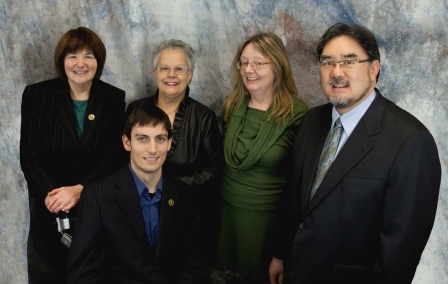CHAMPION SUPPORTER: Village of Cumberland (December 2012)
About the Village of Cumberland
 Nestled in the foothills of the Beaufort Range beneath the shadow of the Comox Glacier, the historic Village of Cumberland was a bustling coal mining town from 1888 to 1966. The Village has a population of ~3400.
Nestled in the foothills of the Beaufort Range beneath the shadow of the Comox Glacier, the historic Village of Cumberland was a bustling coal mining town from 1888 to 1966. The Village has a population of ~3400.
Cumberland is one of the three municipalities that comprise the Comox Valley. The other two are the City of Courtenay and the Town of Comox.
Cumberland was founded in 1888 by coal baron Robert Dunsmuir. The original settlement was named Union after the Union Coal Company.

CUMBERLAND COUNCIL: Left to Right: Councillor Gwyn Sproule, Councillor Conner Copeman, Mayor Leslie Baird, Councillor Kate Greening, Councillor Roger Kishi
Convening for Action on Vancouver Island
Since 2008, the Village of Cumberland has been a champion for the CAVI-Convening for Action on Vancouver Island initiative. Cumberland is a member of the Comox Valley Regional Team and is the host and chair of the 2013 Comox Valley Learning Lunch Seminar Series. The regional team comprises representatives of the City of Courtenay, Town of Comox, Comox Valley Regional District, Comox Valley Land Trust, TimberWest, and Partnership for Water Sustainability in BC. The Courtenay representative (Derek Richmond) is also CAVI Chair.
 “If you are going to align efforts on a watershed scale, then getting it right at the front-end means looking beyond your boundaries to envision the bigger picture. In other words, global thinking for local action. It means you are communicating and cooperating with others to ensure that your collaborative results are coordinated in a timely manner,” explains Derek Richmond.
“If you are going to align efforts on a watershed scale, then getting it right at the front-end means looking beyond your boundaries to envision the bigger picture. In other words, global thinking for local action. It means you are communicating and cooperating with others to ensure that your collaborative results are coordinated in a timely manner,” explains Derek Richmond.
Village of Cumberland is a Champion Supporter of the Partnership for Water Sustainability
“The Champion Supporter designation is the Partnership’s way of formally recognizing government and non-government organizations that provide the Partnership with ongoing financial and/or in-kind support; and also play  a leadership role in the ‘convening for action’ initiative,” wrote Tim Pringle, the President of the Partnership, in a letter to Mayor and Council.
a leadership role in the ‘convening for action’ initiative,” wrote Tim Pringle, the President of the Partnership, in a letter to Mayor and Council.
“We are pleased to inform Mayor and Council that the Village of Cumberland is hereby deemed to be a Champion Supporter of the Partnership for Water Sustainability in British Columbia.”
Inter-Regional Education Initiative
“Commencing in 2008 with participation in the inaugural Comox Valley Learning Lunch Seminar Series, the Village has made a material  contribution to the success of the CAVI initiative,” states Kim Stephens, Partnership Executive Director and facilitator for the annual Comox Valley series. “The Comox Valley is a provincial demonstration of what can be accomplished by a ‘regional team approach’. We highlighted the Comox Valley experience at the 2011 Vancouver Island Economic Summit.”
contribution to the success of the CAVI initiative,” states Kim Stephens, Partnership Executive Director and facilitator for the annual Comox Valley series. “The Comox Valley is a provincial demonstration of what can be accomplished by a ‘regional team approach’. We highlighted the Comox Valley experience at the 2011 Vancouver Island Economic Summit.”
“The Partnership values our relationship with the Village and greatly appreciate the Village’s ongoing contributions through the participation of Judy Walker on the regional team. Judy is the chair and the Village is the host for the 2013 Comox Valley Learning Lunch Seminar Series.”
“Significantly, the 2012 set of regional team working sessions constituted “proof of approach” for the Inter-Regional Education Initiative on Rainwater Management in a Watershed Sustainability Context (IREI). The experience gained will help facilitate full-scale implementation on both sides of the Georgia Basin in 2013 and beyond,” concludes Kim Stephens.
Get It Right at the Front End
 “The change in approach starts with land use planning and determining what infrastructure and services can be provided sustainably, both fiscally and ecologically. Another key message is that all those involved in land development have a role to play in achieving Sustainable Service Delivery,” Judy Walker stated at the 2011 Summit.
“The change in approach starts with land use planning and determining what infrastructure and services can be provided sustainably, both fiscally and ecologically. Another key message is that all those involved in land development have a role to play in achieving Sustainable Service Delivery,” Judy Walker stated at the 2011 Summit.
Judy and other members of the regional team spoke to this key message: Get it right at the front-end for long-term sustainability.
Sustainable Service Delivery
“The legislative authority for integration of land use planning and asset management, including financial management, already exists within the Local Government Act and Community Charter,” states Glen Brown, Deputy Inspector of Municipalities. “Local governments can develop a truly  integrated Asset Management Strategy that views the watershed through an environmental lens.”
integrated Asset Management Strategy that views the watershed through an environmental lens.”
“The Province is challenging local governments to think about what asset management means BEFORE the asset is built. Sustainable Service Delivery is the Province’s branding for a life-cycle way of thinking about infrastructure needs and how to pay for them over time.”




